PACHINKO
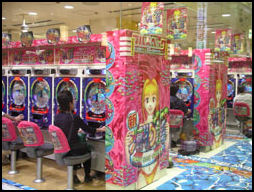
Pachinko parlor Pachinko is a pinball-like game, unique to Japan, that yields rewards like a slot machine. Players release steels balls with a handle through a maze of vertical pins, plastic opening-and-closing flowers and spinning numbers.
There are around 20,0000 pachinko parlors scattered across Japan. Every Japanese town has several parlors filled with flashing lights and pulsating disco music. Some are the size of supermarkets. Many are located near train stations or along busy highways. They and Japanese game arcades are really noisy.
The first pachinko parlors opened in 1948 and for many years they were regarded as shady, smoke-filled hangouts for gangsters and lowlife. As Japan became more prosperous, pachinko parlors became increasingly more popular with housewives and salarymen.
Good Websites: Article from Mangajin Magazine mangajin.com/ ; Pachinko.com pachinko.com/english/ ; First Hand Account of Day in Pachinko Parlor seekjapan.jp ; Wikipedia article Wikipedia ; Pachinko Addiction japansociety.org ; Pachinko Machines custompachinko.com ; Vintage Pachinko Machines vintagepachinko.com ; Nicholas Cage and Pachinko japander.com/japander/cage
Links in this Website: SPORTS AND RECREATION IN JAPAN (Click Sports, Recreation, Pets ) Factsanddetails.com/Japan ; BICYCLES, HORSES, BOATS AND GAMBLING IN JAPAN Factsanddetails.com/Japan ; PACHINKO Factsanddetails.com/Japan ; GAMES IN JAPAN Factsanddetails.com/Japan ; TOYS IN JAPAN Factsanddetails.com/Japan ; VIDEO GAMES IN JAPAN Factsanddetails.com/Japan ; SONY VIDEO GAMES Factsanddetails.com/Japan ; NINTENDO Factsanddetails.com/Japan
Pachinko Players
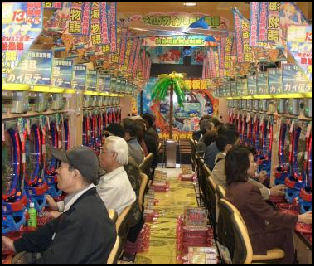
An estimated 30 million Japanese (a quarter of Japan's population) play pachinko. On any given Sunday some 6 million Japanese play the game. Gross revenues from the game doubled between 1989 and 1995, not so much because the game became more popular but rather because the people who played the game lost more money.
Explaining the appeal of the game, one pachinko player told the Los Angeles Times, "When you play pachinko, you think of nothing. It's good to have time like that." Another player told AFP, "There is a certain magic. Even if you are worn out by playing, you are still willing to play longer and forget about everything else."
A self-confessed pachinko addict wrote to an advise column in the Daily Yomiuri, “Pachinko has long been my favorite pastime, but now it is an obsession...Whenever I have spare time, I leave the children with my mother and go to the pachinko parlor. I know I must stop, but the excitement makes me want to return again and again, and losing money doesn't hold me back...I can; stop thinking about it, and I can't fight the urge to play...My husband is not aware of my habit."
Pachinko Winnings
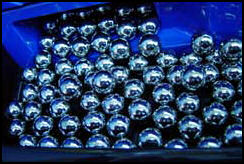
Pachinko winnings are in the form of more balls that are deposited in a tray below the machine when the balls hit jackpots in open flowers or spinning numbers. The timing of sending ball into a winning slot is key. If a ball goes in the slot at the right time the winning can be multiplied many times over and the player can accumulate deep trays filled balls
Technically pachinko is not a form of gambling. The steel balls amassed winners can be redeemed for prizes such as T-shirts, lighters, cosmetics, bottles of soy sauce, candy, cigarettes and even computer software.
Nine of ten winners prefer to take seemingly worthless items like plastic boxes or cigarette lighter flints which can be taken to a nearby, technically-independent operation called a “kankin”, usually located in a small hut, that exchanges the prizes for cash. The prizes are then sold back to the parlor and recycled.
Pachinko Winners
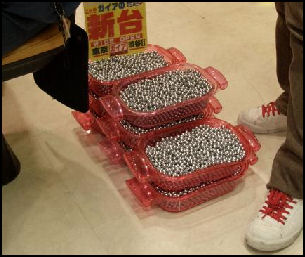
Quasi-professional pachinko winners make large sums of money by studying the pay-off patterns of machines and playing them when they are most likely to make a large pay off. One young man with dyed red hair and long baggy trousers told the Los Angeles Times, "I win almost everyday." At the time he was interviewed he had just won about $90 in 30 minutes, He said he had won $750 the day before on a 4 percent initial investment and won $900 the day before that.
Pachinko sharks usually like to play new machines because they are generally programmed to make larger and more frequent payoffs to attract new customers. These machines are reset after a few days, either electronically or by moving the nails. The sharks try to get at the machines with high payoffs before they are readjusted.
Some sharks spend about a week watching which machines pay off well. Others use more unscrupulous methods. Ethnic Chinese reportedly have used magnets to guide a steel ball through the maze of pins and made huge killings.
Pachinko Losers
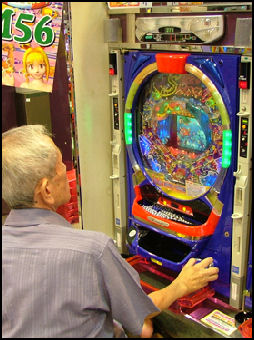
Japan's 30 million pachinko players lose an estimated $1,200 each annually each. A part-time drug store clerk told the Los Angeles Times that she and her boyfriend play pachinko about twice a week, and on average lose $800 a month (a large portion of their income).
A pachinko loser, who became addicted to the game after winning a few hundred dollars from a $5 bet and now loses about $400 a month, told the Los Angeles Times, "When I won money I acquired a taste for it. I got hooked on it because of that...When you are playing the slot machine [one of the high-risk high-payoff varieties], the sense of tension is a great feeling. Once you've experienced that feeling of suspense, you never forget it."
An estimated 5 million pachinko players are "heavy users" who risk large amounts of money. One of the more extreme pachinkoholica was a construction workers who held a 2-year-old boy hostage for a day at a Tokyo post office in effort to steal enough money to pay off his pachinko debts.
Pachinko Deaths
According to a survey conducted by the Japanese newspaper Mainichi Shimbun, 30 children died between April 1995 and June 1996 while their parents were playing pachinko. They included a boy who fell into a water-filled ditch, and several children hit by vehicles while their parents were playing pachinko. Police brought charges of negligence against one woman who got so involved in playing pachinko on a steamy summer day that she forget about her two sons who were locked inside her car. The two boys died.
In August 2012, The Yomiuri Shimbun reported: “A woman was arrested on suspicion of causing the death of her 5-month-old baby by leaving him alone in a car in the summer heat while she played pachinko. According to police, 45-year-old Takako Sato allegedly left her son Ryosuke in a car in the parking lot of a pachinko parlor for three hours until about 5:20 p.m., apparently causing him to die of heat stroke. [Source: Yomiuri Shimbun, August 18 2012]
The boy was in a baby seat in the backseat and had no signs of injury. The car's air conditioner was turned off, and the parking lot had no roof. According to the Tsu District Meteorological Observatory, the highest temperature of the day in Kuwana was 32.9 C, recorded at 3:10 p.m. Sato has reportedly admitted to the allegations, saying that she wanted time to herself to think and started playing pachinko at around 2:30 p.m.
Pachinko Business
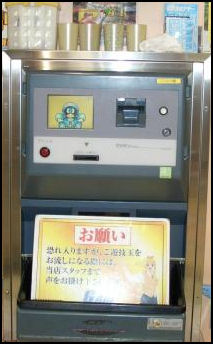
pachinko vending machine Pachinko revenues in 2002 were $280 billion (more than the worldwide sales of the entire Japanese automobile industry or the gross national product of India that year). About 87 percent of the parlors revenues are returned, which means that the pachinko industry takes in about $36 billion a year.
The pachinko industry employs 320,000 people, including many former criminals who have difficulty finding any other kind of job. It also spends an estimated $23 billion on parlor construction, new machines, computer equipment, prizes for winners and soft drinks sold in the parlors.
In 2003, twelve of the top 100 income earners for that year were pachinko executives. Chang Woo Had, a Korean-Japanese, was at the top As founder and chairman of Maruha Corp., he presides over 121 pachinko parlor empire that stretches from Hokkaido t Kyushu and took in more than $4.8 billion in 2002.
Players buy balls when they enter pachinko parlors, and usually win more balls than they buy. The parlors make their money by charging the equivalent of about 4 cents for each ball but redeeming them for only of 2.5 cents a ball. A typical player who buys 1,000 balls wins 1,400 balls but loses 13 percent of his or her money after the balls have been redeemed.
Sammy and Sankyo are the largest makers of pachinko machines. Kino Busajima, the eight-something chairman of the Pachinko gambling machine maker Sankyo, was ranked the third wealthiest person in Japan by Forbes in May 2008, with a net worth of $5.4 billion, up $1.2 billion from the previous year. In 2009 he was second with $5.2 billion.
Pachinko Investments and Marketing
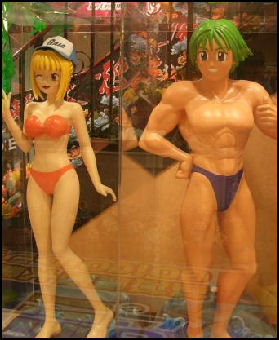
In an effort to draw new players, pachinko parlors have installed smoke free rooms, love seats for couples, and machines that temporarily offer jackpots or more than $1,000 from an investment of a few yen. They have also hired college graduates as managers and tried to make the atmosphere of the parlors more appealing.
The money in pachinko is so big that mainstream companies shave started investing in the business. The government is reluctant to regulate pachinko because the game is so popular, large corporations have invested in it, politicians receive large contributions from pachinko owners and the government doesn't want to be accused of discriminating against Koreans.
To attract customer parlors have coolers for housewives store groceries and prized geared form specific demographics (golf balls for older players and leather handbags for young ladies).
Pachinko Industry and North Korea
About 70 percent of the pachinko parlors in Japan are owned by ethnic Koreans, and about 30 percent of the Korean-owned enterprises are run by people loyal to North Korea. It is estimated that several hundred million to several billion dollars of revenues from pachinko is funneled every year into North Korea, which is desperate for hard currency to buy weapons and technology that can be used in its nuclear program.
Pro-Pyongyang owners tend be very secretive about their activities. "Everyone knows that some of the money has probably gone to North Korea's effort to build nuclear weapons," one South Korean told the Los Angeles Times. "Some pachinko owners linked to North Korea would like to cut those ties. But if they do, their relatives in North Korea will suffer. It's as if North Korea is holding hostages."
Pachinko Fraud and Gangsters
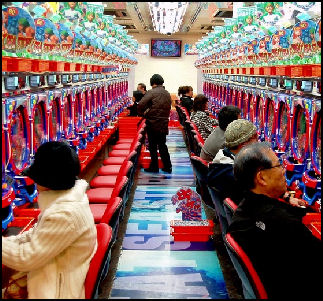
In an effort to keep tabs on pachinko industry, the Japanese government allowed owners to install high-stake machines in return for accepting stricter controls based on a system in which customers pay with magnetic cards. The system has turned be a disaster. The cards are easy to forge.
Pre-paid cards used by around 70 percent of the parlors. The biggest winners have been the criminals gangs that make the forged cards and the biggest losers have been the card manufacturers — Mitsubishi and Sumitoro — because they earn their revenues from the cards and pay the parlors for allowing them to use them. Mitsubishi and Sumitoro lost over $525 million in 1996.
Gangsters also extort "protection" money from the huts that exchanges the pachinko prizes for cash. An estimated 30 percent of the kankins (huts where players exchange prizes for cash) are controlled by the yakuza.
Pachinko Decline
In December 2012, Kazumichi Shono wrote in the Yomiuri Shimbun: “According to a leisure white paper issued by Japan Productivity Center, pachinko parlor sales have declined for eight consecutive years since 2003. Sales were about 18.89 trillion yen in 2011, down 36 percent from 2003. In addition to the prolonged economic downturn, tighter regulations on "pachisuro" slot machine operators not to overly incite a fever for gambling, which was in place until 2007, is also believed to have affected sales. [Source: Kazumichi Shono, Yomiuri Shimbun, December 25, 2012]
Although economic conditions are difficult, the pachinko industry is still financially sufficient. A source close to the industry said there is a feeling in the industry that it should undertake casino-related projects now, so as not to miss out on opportunities if laws change. Organizations have been set up around the nation to promote the building of casinos, touting them as effective means for revitalizing tourism. There is also an increasing move among nonpartisan lawmakers to back the efforts.
Pachinko Moving Into the Golf and Casino Businesses
In December 2012, Kazumichi Shono wrote in the Yomiuri Shimbun: “Major pachinko parlor operators are expanding into golf course operations as they are seeking new primary revenue sources to turn themselves into comprehensive leisure providers amid a shrinking pachinko market due to the economic slump. Debate over the legalization of casinos, which has increased in recent years, is also believed to be behind the move. [Source: Kazumichi Shono, Yomiuri Shimbun, December 25, 2012]
PGM Holdings K.K., the nation's second-largest golf course operator, began a takeover bid for Accordia Golf Co., the industry's largest, in November 2012. The move by PGM, a subsidiary of pachinko machine manufacturer Heiwa Corp., is considered a part of reorganization efforts, cutting across the lines between industries. PGM is believed to be aiming to buy up to 50.1 percent of Accordia shares worth about 42.5 billion yen. If the takeover is successful, it would create a huge company, which would own about 10 percent of the nation's 2,400 golf courses, six times that currently owned by the nation's third-largest golf course operator. Heiwa bought PGM in December 2011 from a U.S. investment firm, which was the majority shareholder, for about 50 billion yen.
Some observers said such a move is related to debates over the legalization of casinos, which have intensified recently in many areas including Tokyo and Osaka. Casinos often are part of leisure and resort complexes overseas that include golf courses. A Heiwa official also said the firm is studying various options, including casinos. In 2008, pachinko machine manufacturer Universal Entertainment Corp. announced a plan to build a casino resort in the Philippines. The facility is expected to open in 2014. The firm also said earlier this month it will study taking part in a casino resort development in South Korea.
A Universal official said the company will consider running a casino in Japan once it is legal to do so, using the know-how it accumulates in its overseas casinos. Pachinko machine maker Sega Sammy Holdings Inc. decided in February to purchase Phoenix Resort K.K., which runs the Phoenix Seagaia Resort in Miyazaki Prefecture. Sega Sammy also announced plans in May to open a casino in South Korea. Another pachinko operator is said to be looking to buy Taiheiyo Club Co., an established golf course operator undergoing reorganization.
Image Sources: Tokyo Pictures, Japan Visitors, Japanball,com
Text Sources: New York Times, Washington Post, Los Angeles Times, Daily Yomiuri, Times of London, Japan National Tourist Organization (JNTO), National Geographic, The New Yorker, Time, Newsweek, Reuters, AP, Lonely Planet Guides, Compton’s Encyclopedia and various books and other publications.
Last updated January 2013
